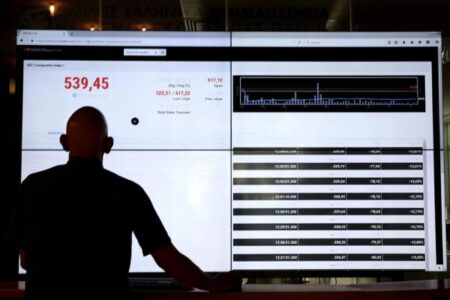Investing.com – European stock markets edged mostly lower Monday, weighed by weakness from healthcare giant Philips, at the start of a week packed with event risks.
At 08:20 ET (12:20 GMT), the in Germany traded 0.2% lower, while the in the U.K. dropped 0.4%, while the in France rose 0.1%.
Philips cuts 2024 sales forecast
There are more quarterly corporate earnings to digest in Europe this week, with results from Philips (AS:) Monday’s highlight.
The Dutch medical devices maker’s stock slumped 17% after the company lowered its sales forecast for the year due to declining demand in China, which pushed its order intake down 2% in the third quarter.
Philips now expects comparable sales to grow by 0.5% to 1.5% in 2024, down from a previous expectation of 3% to 5%.
A lot of the week’s attention, however, will be on the results from five of the “Magnificent Seven” US tech stocks that have played an outsize role in driving market gains over the past couple of years.
Google parent Alphabet (NASDAQ:) is due to report on Tuesday, followed by Microsoft (NASDAQ:) and Facebook parent Meta Platforms (NASDAQ:) on Wednesday and Apple (NASDAQ:) and Amazon (NASDAQ:) on Thursday.
Middle East in focus
Sentiment has received a boost Monday from the cooling geopolitical situation in the Middle East after weekend airstrikes by Israel against Iran did not target oil or nuclear facilities as feared.
“The more targeted response from Israel leaves the door open for de-escalation,” said analysts at ING, in a note. “While it is still unclear if or how Iran may retaliate, the government has downplayed the damage caused by Israel’s response.”
Key economic data due
Elsewhere, Monday is thin on economic data releases, but the week ahead brings eurozone third-quarter and to guide the market’s thinking of how aggressively the European Central Bank will cut interest rates going forward.
The has cut interest rates three times already this year, all by 25 basis points, but speculation is growing that ECB policymakers will agree to a larger rate cut at the next meeting.
Data released earlier Monday showed that Ifo’s indicator for German export expectations fell to minus 6.7 points in October from minus 6.5 points the prior month, with the automotive and metal sectors anticipating the heaviest losses in international trade.
Britain’s new Labour government also unveils its first budget on Wednesday, while Friday sees the release of the widely-watched monthly official jobs report in the US.
Crude slumps on eased tensions
Oil prices fell sharply Monday after Israel’s retaliatory strike on Iran over the weekend avoided Tehran’s oil and nuclear facilities, easing geopolitical tensions in the Middle East.
By 08:20 ET, the contract dropped 5.9% to $71.17 per barrel, while futures (WTI) traded 6.2% lower at $67.33 per barrel.
Traders had feared that any attacks on Iran’s oil and nuclear infrastructure would mark a dire escalation in the conflict, potentially disrupting oil supplies from the crude-rich region.
Iran downplayed the impact of the attack, but still threatened retaliation.
The strike saw traders price out a risk premium from crude prices, and put focus back squarely on demand, which is expected to weaken in the coming months.
Read the full article here















